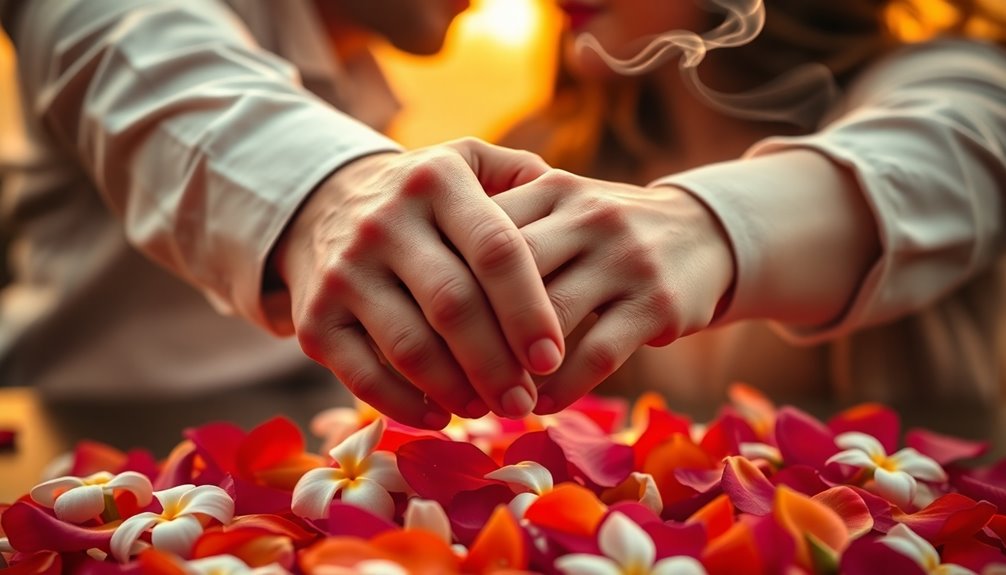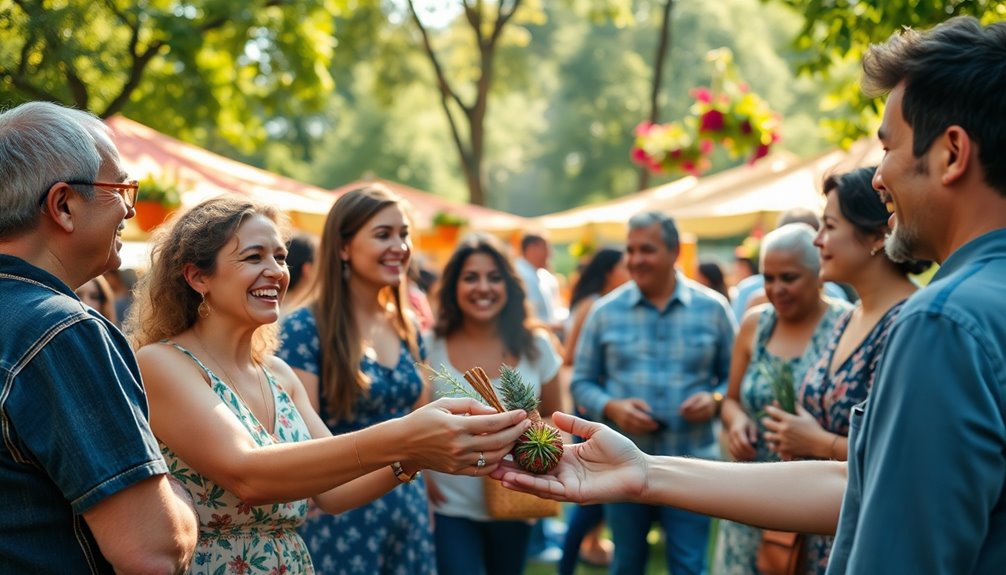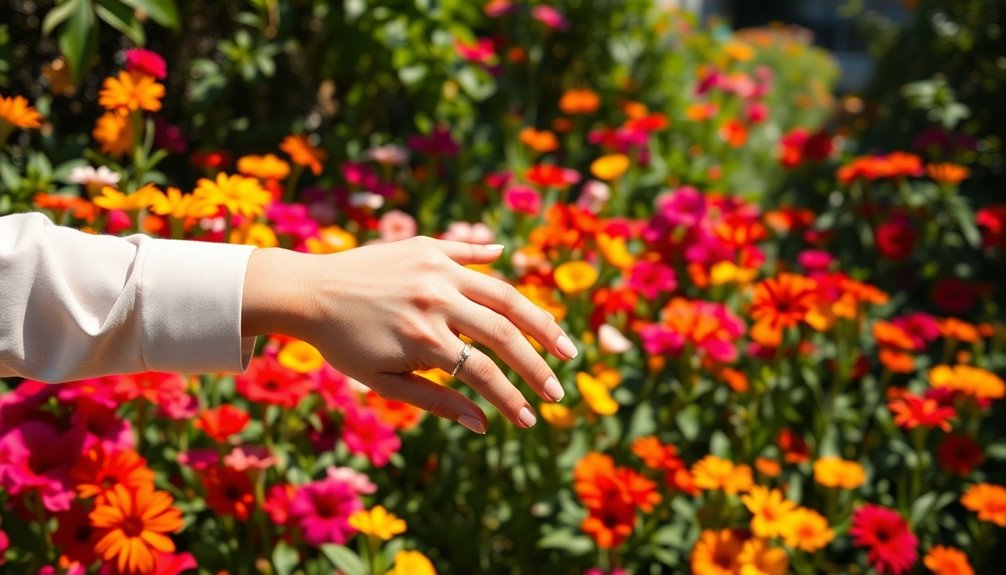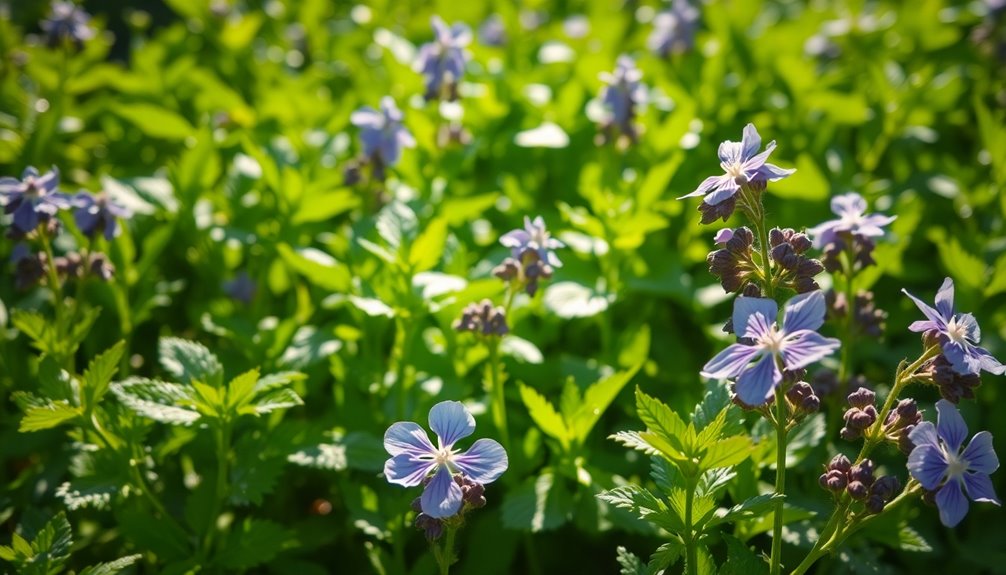Aromatic sexuality is when you experience sexual attraction without feeling romantic connection. It's a distinct part of the aromantic spectrum, showing that sexual desire and romantic feelings aren't the same. Many aromantic individuals prioritize deep platonic relationships and emotional intimacy over traditional romantic expectations. This allows for connections that challenge societal norms, such as queerplatonic or long-term commitments. You might find that misconceptions about aromanticism often overlook the rich emotional experiences these individuals have. Understanding aromatic sexuality can enhance your appreciation of diverse identities and relationships. There's more to uncover about this unique perspective on attraction.
Key Takeaways
- Aromatic sexuality refers to experiencing sexual attraction without any romantic feelings or desires.
- Aromantic individuals may engage in sexual relationships while prioritizing emotional intimacy over romance.
- Distinctions exist within aromatic identities, such as grayromantic and cupioromantic, which explore varying attractions.
- Aromanticism is separate from asexuality; individuals can experience sexual desire even without romantic interest.
- Community support and events, like Aromantic Spectrum Awareness Week, foster understanding and challenge societal misconceptions about aromantic individuals.
Understanding Aromatic Sexuality

Understanding aromatic sexuality can be enlightening, especially when you realize that it exists alongside various sexual orientations. Aromantic individuals don't experience romantic attraction, yet they may still feel sexual desire, showcasing a distinct separation between romantic and sexual attraction.
Within the aromantic spectrum, identities like grayromantic and cupioromantic highlight the nuances of attraction, where some may seek emotional bonds without traditional romantic relationships. Many aromantic people navigate their sexual orientation independently, allowing them to form connections that defy societal norms regarding romance.
Engaging in sexual relationships without the expectation of romance can be liberating, emphasizing that attraction is complex and varied. Aromatic sexuality enriches our understanding of asexuality and expands the dialogue around diverse experiences of love and connection.
Distinction From Aromanticism

Aromatic sexuality often gets mixed up with aromanticism, but they aren't the same.
While aromantic individuals experience an absence of romantic interest, those who identify with aromatic sexuality feel sexual attraction without wanting romantic relationships. This distinction is essential; you can engage in sexual activities and relationships while lacking romantic desire.
Aromanticism emphasizes the lack of romantic attraction, whereas aromatic sexuality highlights the presence of sexual desire. Some aromantic individuals may identify as asexual, but you can still experience sexual desire and intimacy without romantic components.
Understanding this distinction helps in recognizing the diverse sexual and romantic orientations within the asexual spectrum, allowing for clearer discussions about personal experiences and identities.
Experiences and Relationships

While many people assume that relationships must be romantic to be meaningful, aromantic individuals often find deep connections through different forms of companionship. They prioritize emotional intimacy and platonic love, maneuvering societal pressures and amatonormativity. Here are some relationship types that highlight these connections:
| Relationship Type | Description |
|---|---|
| Platonic Relationships | Deep friendships without romantic feelings |
| Queerplatonic Relationships | Unique bonds with emotional and sometimes sexual intimacy |
| Familial Relationships | Close connections with family members |
| Cohabitation | Living together without romantic involvement |
| Long-term Commitments | Committed partnerships that lack romantic expectations |
Community support, especially during events like Aromantic Spectrum Awareness Week, helps aromantic individuals share their experiences and celebrate diverse relationship dynamics.
Myths and Misconceptions

Have you ever wondered about the misconceptions surrounding aromantic individuals? Many people mistakenly believe that aromanticism means a lack of love or emotional connections. In reality, aromantic people can experience deep platonic love and cherished friendships.
Another common misconception is that aromanticism equates to asexuality; however, aromanticism specifically relates to romantic attraction, while asexuality concerns sexual attraction.
Some think aromantic individuals shy away from physical intimacy, but many have diverse preferences regarding touch.
There's also a stereotype that aromantic people are cold or emotionless, yet they can express joy and empathy.
Finally, many assume aromantic individuals don't desire relationships, but they can seek fulfilling partnerships, including queerplatonic relationships, that provide meaningful connections without romance.
Community Support and Resources

How can the aromantic community find support and resources to navigate their unique experiences?
Organizations like AUREA (Aromantic-spectrum Union for Recognition, Education, and Advocacy) offer essential community support and resources tailored for aromantic individuals.
The Aromantic Census provides insights that enhance visibility and understanding of diverse aromantic identities.
Events like Aromantic Spectrum Awareness Week (ASAW) foster discussions and education within the community.
You can also explore online forums and social media groups to connect with others and share experiences.
The Ace and Aro Advocacy Project supplies educational materials that challenge misconceptions and raise awareness about aromanticism.
Importance of Awareness and Advocacy

Awareness and advocacy play crucial roles in fostering a more inclusive society for aromantic individuals, as they help challenge prevailing misconceptions and societal norms.
Events like Aromantic Spectrum Awareness Week promote understanding and visibility of aromantic identities, encouraging community engagement.
Organizations such as AUREA work tirelessly to advocate for rights and recognition, providing resources to combat arophobia and societal pressures.
The Aromantic Census 2020 revealed significant demographics and experiences, enhancing awareness and research.
Increased representation of aromantic characters in media, supported by public figures, helps dismantle stereotypes and fosters acceptance of diverse sexual orientations.
Frequently Asked Questions
What Is the Meaning of Aromatic Sexuality?
When you think about sexual orientation, you may find it important to understand the nuances between different identities.
Aromatic sexuality isn't a recognized term, but it's often confused with aromanticism, which describes those who lack romantic attraction.
If you're exploring this concept, remember that individuals can still experience sexual attraction without romantic feelings, leading to various identities on the spectrum.
It highlights how your relationships can be intimate without necessarily being romantic.
Can an Aromantic Person Fall in Love?
You might think aromantic individuals can't fall in love, but that's only part of the story.
While they don't experience romantic attraction, they can form deep emotional connections that feel similar to love.
These bonds, often platonic or queerplatonic, can be incredibly meaningful.
What Does Aromatic Mean in Dating?
In dating, "aromatic" means you mightn't experience romantic attraction, focusing instead on companionship or emotional connections.
You can build deep relationships without the pressure of romance, allowing you to enjoy intimacy and support without traditional dating expectations.
It's about exploring connections that feel right for you, whether that's through queerplatonic partnerships or friendships.
Understanding this can help you navigate relationships authentically, aligning them with your feelings and desires.
What Does It Mean When Someone Says They Are Aromatic?
When someone says they're aromatic, it's easy to picture fragrant flowers blooming, yet this term's often confused. Aromatic refers to pleasant scents, not feelings.
If someone identifies as aromantic, they're expressing a lack of romantic attraction. You'll find they might still connect deeply in friendships or experience sexual attraction.
Understanding this distinction helps clarify the rich tapestry of human relationships, highlighting that love and attraction come in many forms beyond romance.
Conclusion
To sum up, embracing aromatic sexuality is like discovering a unique flavor in a vast buffet; it adds depth to the human experience. Just as some people savor sweet dishes while others prefer savory, your feelings and relationships matter, regardless of societal norms. By understanding and advocating for aromatic identities, you're not just nourishing yourself but also enriching the entire community. So let's celebrate diversity and foster acceptance, ensuring everyone finds their place at the table of love and connection.










